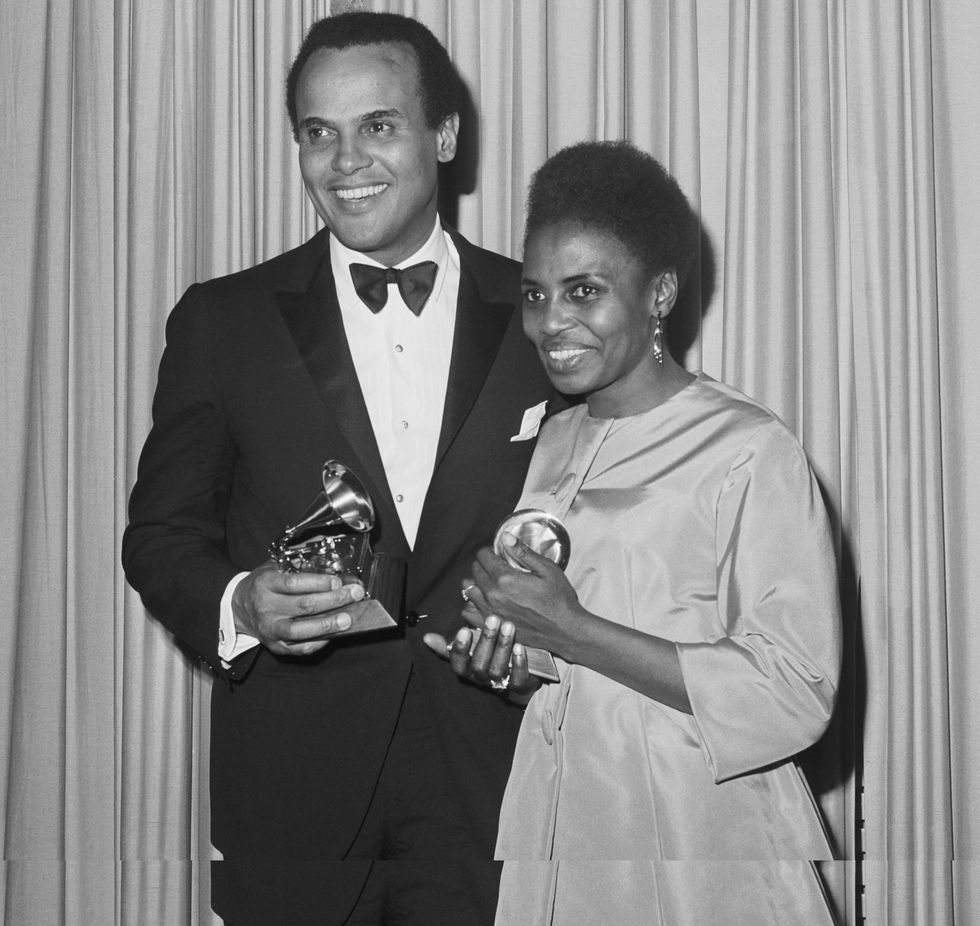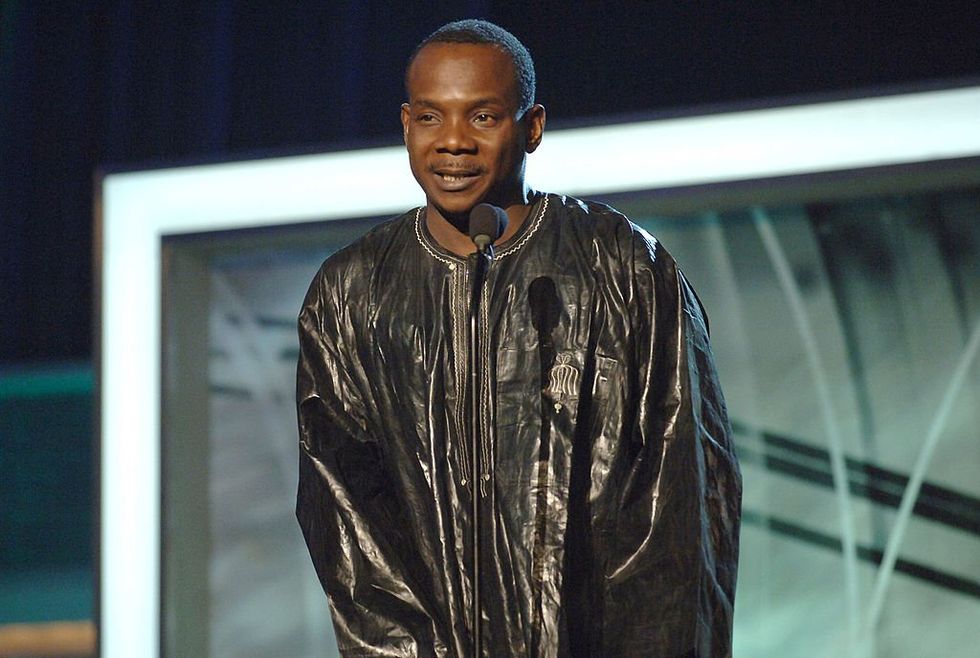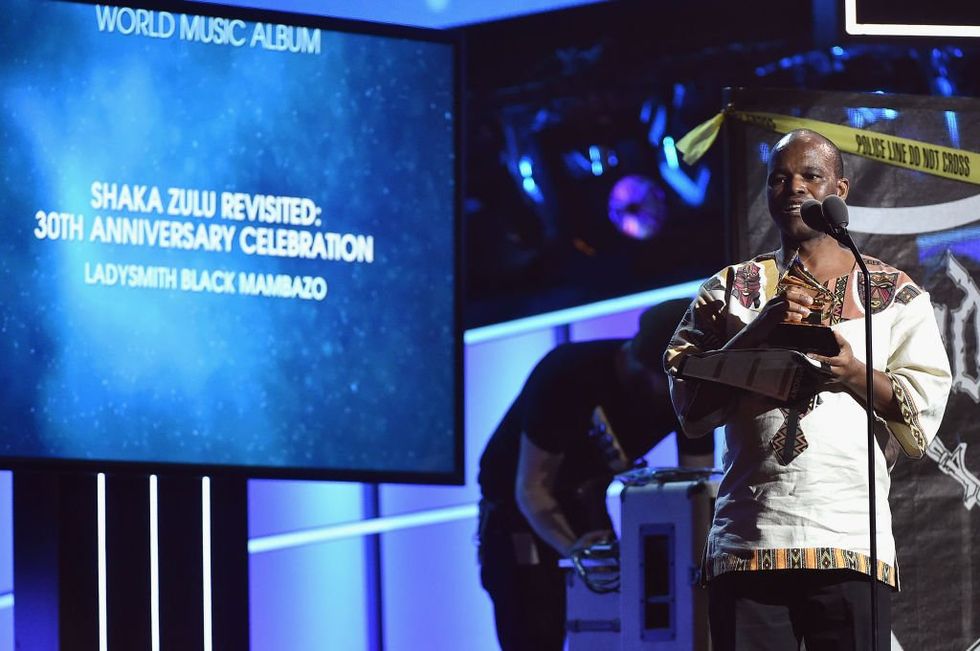9 Standout African Moments in Grammys History
From Miriam Makeba to Angélique Kidjo and Burna Boy, we take a look back at nine iconic moments for African music at the Grammy Awards.

Angélique Kidjo accepts the Global Music Album award onstage during the 64th Annual GRAMMY Awards Premiere Ceremony in 2022 in Las Vegas, Nevada.
For Africans and listeners of African music, the Grammys have become a little more worthwhile. Sunday’s 67th edition will mark the second straight year a Grammy will be awarded in the fairly new Best African Music Performance category.
Despite the qualms, and there are many, the category still deserves excitement because the Grammys mean a lot – to artists and fans. Peering beyond the category, though, there’s no shortage of Africans to root for: Rema and Tems are up for Best Global Music Album, and the latter is also nominated for Best R&B Song, while Beninese icon Angélique Kidjo and Ghanaian reggae legend Rocky Dawuni are vying for Best Global Music Performance.
Also, Nigerian American breakout country artist Shaboozey could win as many as five Grammy awards, with nods for Best New Artist and Best Melodic Rap Performance for his Beyoncé collaboration. Belfast-raised British Nigerian artist Jordan Adetunji is also a Melodic Rap Grammy hopeful for his viral hit song “Kehlani.”
While there will be a lot to look out for on Sunday night, it’s also befitting to look at the past and appreciate African music’s history at the Grammys. Below are nine Africa-related standout moments from “Music’s Biggest Night.”
Miriam Makeba Sets the Tone

Miriam Makeba is one of the most essential figures in African music history. For the majority of her 76 years on earth, she was synonymous with musical excellence and unflinching autonomy. In the 1960s, when she was exiled from the country of her birth and youth, the South African singer became an international star, recording and releasing albums while living in and touring the U.S.
At the 3rd Grammy Awards in 1961, she was nominated three times, including a nod for Best New Artist. Five years later, she won her only Grammy for Best Folk Recording, for An Evening with Belafonte/Makeba, a joint album with the popular American actor and singer Harry Belafonte. That win, the first Grammy for an African artist, set the tone for the Recording Academy’s relationship with African music, an influential moment that still holds a lot of weight six decades later.
Babatunde Olatunji, Sikiru Adepoju & the Drums of Nigeria
“The spirit of the drum is something that you feel but cannot put your hands on,” revered percussionist and composer Babatunde Olatunji once said. With his 1959 debut album, Drums of Passion, Olatunji emerged as a seminal figure for popularising African music outside the continent, influencing many artists, including John Coltrane, the Latin Rock band Santana, and Grateful Dead drummer Mickey Hart. On Hart’s 1991 album, Planet Drum, Olatunji was a primary contributor in an ensemble that combined drum music from percussionists around the world.
Planet Drum went on to win the inaugural Grammy award for Best World Music Album in 1992. Also a key contributor to the album was Sikiru Adepoju, the Nigerian talking drum maestro who was a member of Olatunji’s band, Drums of Passion, during its productive run in the 1990s. On Hart’s 2007 album, Global Drum Project, Adepoju is credited as a primary artist on all eight songs, earning him a gramophone when the LP won the Grammy for Best Contemporary World Music Album. Both Olatunji and Adepoju are pioneer figures for Nigerian representation at the Grammys, reverential figures who continue to anchor Nigerian music’s growing history at the awards.
The Double Magic of Ali Farka Touré & Toumani Diabaté

In 2006, Malian folk auteurs Ali Farka Touré and Toumani Diabaté won the award for Best Traditional World Music Album with their joint album, In the Heart of the Moon. Considering the novel wins by Miriam Makeba and Mickey Hart, along with Farka Touré’s first Grammy win in 1995, for a collaborative album with American composer Ry Cooder, all-African wins seemed to need the validating presence of a western artist. That both artists snagged this award while being from the same country makes this feat quite special in retrospect.
Prior to the making of In the Heart, both artists admired each other’s work from afar, operating on different sides of Malian folk. Touré was a blues guitarist whose music is deeply informed by Songhai traditions in Northern Mali, while Diabaté is a Kora player from a lineage of griots in the south. In 2010, they reunited for an eponymous sequel, Ali and Toumani, which also won a Grammy in the same, now defunct category. These wins help immortalize a pure partnership that was built on mutual respect between two African music greats.
Ladysmith Black Mambazo and Soweto Gospel Choir Ride Rustic Charm to Multiple Wins

It’s difficult to pick the most gratifying Grammy win for the ultra-popular South African vocal ensembles, Ladysmith Black Mambazo and Soweto Gospel Choir; the former is the second most awarded African act with four wins, while the latter has won three times. In the 8-year period where the Recording Academy split the World Music section into Traditional and Contemporary categories, both groups won the Traditional World Music Grammy four times, including a 3-year consecutive run from 2007 to 2009.
After the return to a single category, Ladysmith Black Mambazo shared the win in 2014 and won for a then record-setting fourth time in 2018. In consecutive fashion again, Soweto Gospel Choir won in 2019 for their album of covers, Freedom. The next set of Grammy hopefuls have their work cut out for them if they want to join Ladysmith Black Mambazo and Soweto Gospel Choir as the most prominent representations of South Africa at the Grammys.
Tinariwen’s Desert Rock Odyssey Gets a Grammy
Tinariwen was forged out of conflict and its music is a consistent reflection, none more than their 2011 opus, Tassili. A decade prior, the Malian band released The Radio Tisdas Sessions, its first album to be distributed outside the Sahel region, where they were already local heroes in the ‘80s and ‘90s. The international debut reached a wider audience, making the band a live touring favourite outside Africa. They recorded and released three more albums before Tassili, each invoking the decades-long political conflict that has consistently unsettled the Tuareg people of Mali.
On Tassili, the band goes back to its origins of being formed with its members in political exile. “Those were times when we would sit around a campfire, singing songs and passing around a guitar,” band member Eyadou ag Leche said in an interview. Recorded in Algeria, due to conflict in Mali, the resulting album is a hard-swinging jam session that also won the Grammy for Best World Music Album. Already established in the World Music circuit as an electric act, the win further validated Tinariwen’s greatness and expanded the musical scope of African winners in this category.
Angélique Kidjo’s Bracing Speech at the 2020 Grammys
Because the Best World/Global Music categories are announced during the premiere show, hours before the Grammys main ceremony starts, there’s little pomp attached to the speech shared by its winner. That doesn’t mean a statement can’t be made, as shown in 2020 by African music icon, Angélique Kidjo. After picking up her fourth Grammy for Celia, the Beninese singer dedicated her acceptance speech to artists expanding the presence of African music in global pop music.
“Four years ago on this stage, I was telling you that the new generations of artists coming from Africa are going to take you by storm and the time has come,” she declared, dedicating the award to fellow nominee Burna Boy. She reiterated the sentiments when she won her fifth Grammy for Mother Nature in 2022. As shown in her willingness to collaborate with younger African artists, Kidjo isn’t just interested in being a pacesetter, she’s also holding the door open.
Burna Boy’s Ecstatic Reaction to Finally Getting One
Burna Boy Wins Best Global Music Album | 2021 GRAMMY Awards Show Acceptance Speech
As soon as he was within touching distance, Burna Boy made his desire to win a Grammy very explicit. He sang it clearly on the eponymous intro to his 2019 blockbuster album, African Giant, and when he lost out at first try, he admitted to feeling “sick as f**k” on “Level Up,” the opening song on 2020’s Twice As Tall. A year after the dejection, he was ecstatic, screaming into a screen after winning the award for Best Global Album.
With the world still socially-distanced, Burna was in Lagos and he performed an elaborately choreographed set during the premiere show, and it was very fitting that he won his coveted Grammy surrounded by family and many, many friends while on home soil. Burna is still levelling up, evidenced by his four nominations at this year’s Grammys, three in the global category and a second time nod in a rap category for an African artist. Also, he’ll be performing during the main ceremony, perhaps even more than he dreamed of when his Grammy obsession became public.
Black Coffee’s Historic Win — For Himself & African DJs/Producers
2022 Grammys , Black Coffee won his first-ever Grammy award , Introduces his son on stage.
South Africa has been at the centre of mainstream dance music in Africa for over two decades. While a lot of the exporting focus has been on Afrobeats, variant styles of dance music by South African producers/DJs has permeated festival circuits and party scenes across the world, led by Black Coffee, an highly influential figure in SA dance music — specifically on the house music side of things. In 2022, the eThekwini-born artist became the first African to win the award for Best Dance/Electronic Album, strengthening his case as the greatest South African producer/DJ of his generation. Helped along by collaborations with American artists like Pharrell and Cassie, amongst others, this remains a huge achievement for Black Coffee, but it also reiterates the worthiness of African artists in being nominated, and winning even, outside the confines of the Global categories.
Tyla Wins the First-Ever 'Best African Music Performance' Grammy
As remarkable as it was in the moment, Tyla winning the first-ever Grammy for Best African Music Performance in early 2024 is awe-inspiring in hindsight. A year before, the South African singer was working out the kinks of parlaying early viral success into potential global popularity, a feat she achieved with her smoking hot hit single, “Water.” Across social media, hips gyrated and waists whined to the singer’s inescapable hit, its anthemic hook lodged at the very center of global pop consciousness. The compounding effect of popular music from Africa, aka Afrobeats, was instrumental but Tyla’s pop-piano style also had its unique allure, validated by its historic win. There will be continued conversations about the authenticity of the Best African Music Performance category, however, Tyla’s win will go down as an effective stamp of popular African music further working its way into institutional recognition in the U.S.
- Africa was Well Represented At The 2023 Grammys ›
- Grammys 2024: Here Are the Nominees For the 'Best African Music Performance' Category ›
- The Grammys Announce New African Music Category ›
- Trevor Noah will be Hosting the Grammys for the Fifth Straight Year | OkayAfrica ›
- The 15 Defining African Moments of the Last 15 Years | OkayAfrica ›
- 10 African Records That Would Win Grammys’ New ‘Best Album Cover’ Category | OkayAfrica ›

